Hello and welcome to Episode 14 of the What China Wants podcast.
It has been an eventful summer, and in today’s back-to-school episode we recap some of the interesting events (both political and economic) that have shaped China-Western relations over the last few months.
Some highlights from our discussion:
The fallout from the Nancy Pelosi visit to Taiwan.
The great Chinese drought now happening, and what this means domestically and for regional relations.
The continued travails of the Chinese economy.
The mystery of North Atlantic oil transfers and the potential for Russian sanction busting.

You can also listen to the podcast on Apple, Amazon, or Spotify.
As always please do share, comment, and subscribe. We’ll be back next week with more What China Wants.
Many thanks for listening.
***
Here is the transcript:
Stewart Paterson: Hello, and welcome to What China Wants. My name is Stewart Paterson, and as always, I'm joined by Sam Olsen. Hello, Sam.
Sam Olsen: Hello Stewart, did you have a good summer?
SP: I did. I was in Greece, and I gather you were in Greece too, you've just returned?
SO: Yes, I was taking a little break, looking at some ruins and archaeology, and also looking for any signs of Chinese investment. We didn't have to go too far, I actually spent a lot of time in Piraeus, the port, which has been signed over to new Chinese owners.
SP: Brilliant. Well, look, in this episode of What China Wants, what I think we'd do is that Sam and I are going to round up our observations as to what's been going on in China over the course of the last two months while everyone's been on holiday. And with that in mind, I think Sam we will kick off with your overview of the Pelosi visit. So Sam, how bad has this been for US-China relations?
SO: Well, it's a good question, and I think that the impact is definitely there. It was very noticeable that China kicked up a huge fuss about the visit before and during, not so much afterwards, but by then they've made their point. And the point is quite simple, which is that they have a domestic audience, to show that they refuse to bow down to what they think of as American aggression.
Now, the nuance - the fact that Pelosi went there without Biden's approval, the fact that she went there with a mainly domestic audience in mind herself, and the fact that she's got a long history of winding up the Communist Party, for example, in 1991, when she went to Tiananmen Square and unfurled a banner in commemoration of all the people that had died in the 1989 Tiananmen Square Massacre, if you want to take the Western view on that - all of those things combined to give the Chinese one single story, which is American aggression, as normal, that they are trying to stop the rise of China, they are trying to interfere in Chinese domestic politics, i.e. with Taiwan, and we, as the Communist Party, will tell America and tell the world that we are not to be trifled with. Hence, the pushback verbally, diplomatically, and, of course, militarily, with all the live fire drills that went on.
So it's hard to see how a reaction like that could further American-Chinese relations and do anything other than decrease them a bit. I think what's more important, and this is actually a lesson I wrote about in the Spectatorrecently, the key lesson is for China is that America is willing to rock the boat, but at the end of the day, they are not willing to push back themselves. What I mean by that is, China made a lot of rhetoric, aggressive rhetoric against America, against Taiwan, and set up live fire drills, which in effect, blockaded or were a dry run for a blockade of Taiwan, and were indeed within Taiwanese territorial waters. But America and the West really didn't push back on that. So yet again, we see China upping the ante not having any pushback, and taking another bite out of the Taiwanese status quo.
SP: Is it a bite out of the status quo, as you put it? Because the status quo is that the United States and for that matter, all the Western Allies recognise a 'One China' policy, and that the People's Republic of China is the one China, that's how I understand it. And therefore the status quo is that Taiwan does not really have territorial waters. It might be a fact that Taiwan is sort of self-governing, as it were, at the moment. But isn't the Allied position still supportive of a One China policy? Or has that changed?
SO: No, we are still theoretically all behind the One China policy. But Beijing has obligations in that regard as well, which is not to send in troops, not to interfere domestically within Taiwan, and to basically keep the status quo of Taiwan as this sort of semi-independent but not quite independent, country or nation just off the shores of mainland China. When I say taking a bite out of the status quo, Beijing is very good at saying that it is America and the West who are trying to change the status quo. Whereas actually, it's quite clear that it's China that is trying to change things by calling for reunification.
And what they did, very successfully in my opinion, was to push further along the line towards reunification, using Pelosi visit as the lever. I think that as America tries to sort of keep the status quo, they will find it difficult to do so with China pushing for reunification. Something's got to give at some point.
SP: Now Sam, we have talked to our clients about reunification and the probability of China making a move to force Taiwan's hand in the near future. One of the points that we're keen to labour is that such a move need not be military, that an economic blockade is a very likely scenario. You mentioned that in the live fire drills that were a reaction to the Pelosi visit - there was some disruption to shipping, but it was fairly minimal - but those drills could be perceived as being a practice for a blockade. Is that how you see the drills? And what sort of form would an economic blockade take do you think and what might be the catalysts in the near future that might instigate that?
SO: Yes, we certainly think it was a dry run for blockade, because the live fire boxes, the six of them, surrounded the island. Bear in mind this the first time that they have surrounded the island live fire drills before now have only been within the Taiwan Strait, and now they're expanding into the east of the island. And those boxes basically relate to the main areas of where the ports are in Taiwan.
You're right, we think that militarily it would be a big risk for Xi Jinping in the Communist Party to send hundreds of thousands of troops across the sea when America and Japan said that they will fight. Well, Biden said they will fight, the Japanese have said they will fight and in most likelihood there would be a military mobilisation and things could get out of hand quite quickly.
But China's very adept at winning without fighting, to use the old phrase. I think that by doing blockade, they would have their cake and eat it because they would not only force the Americans and the Japanese to be the aggressors, because they would have to run the blockade and that would appear very badly in the world's media. Secondly, they would get control over Taiwan imports and exports, which includes stopping them re-arming, but also includes getting control of the chips from Taiwan.

And bear in mind that, as everyone that listens to this podcast surely knows, Taiwan is the centre of global chip production. Chinese chips would be to what Russian oil and gas is now; in other words, an impediment stopping a full mobilisation of Western sanctions, because all China needs to do is turn off the chip supplier to Taiwan, and suddenly the car factories, all the factories in the West for that matter, would stop working very quickly because they don't have enough chips in stock. Also the Americans and the Europeans haven't built up their chip manufacturing industry to the degree that they could substitute for lost Taiwanese chips.
So we think we are looking at something along the economic blockade as being more likely than a military invasion. That's our point of view.
But Stewart, one of the things that we also talk about is the fact that China might be encouraged to make a move on Taiwan to distract the people away from its economic woes. And I suppose my question to you is, having spoken earlier this year about the issues around China's economy, has the summer been kind or harsh for the economic prospects of China?
SP: Well the summer has really, I think, proved our point or the point that we were making early in the year in the January-February period, where we were saying that, in all likelihood, the Chinese economy would shrink this year, which of course, on our view, would be the second out of three years in which it had shrunk, because we see 2020 is a down year as well, even though the official data claims that China grew, even at the height of the pandemic. And I think the summer months have gone some way to proving our point. Whether the official statistics bear that out or not, certainly the microeconomic statistics are very supportive of our view. So in short, what we've seen is a continuation of the deterioration in the property market, which seems to be spreading and obviously in the summer months, what we've seen is a mortgage boycott, and the 'where is my condo?' campaign starting to materialise.
Just for those listeners not familiar with the property development market in China, people pay for their apartments in advance off plan when they are unbuilt. And so, a buyer can end up servicing a mortgage for the best part of a year or so before the condo is actually delivered. Now, obviously, as the property companies have struggled, so those delivery times have been pushed out, and some people have been waiting for two or three years now for their apartments to be delivered. So the mortgage boycott is a big issue for the banks and the developers, because it shows the customers are losing faith in their ability to deliver their product.
The spanner in the works, though really, in the last four or five weeks has come from the drought in China. We in the West are wracked by our own cost of living crisis induced by furlough schemes and the invasion of Ukraine by Russia, which obviously has forced up gas prices and food prices as a consequence of that supply shock. China had looked like it was going to be escaping relatively lightly on the cost of living crisis, or at least using numbers that are available, but the drought is taking effect now.
Just for background here, hydroelectricity accounts for just under 20% of China's total electricity output. What China is witnessing in terms of drought is really unprecedented in terms of lack of rain, but also temperatures, records have been broken pretty much on a daily basis. And so what you're starting to see is that lack of electricity feed through into industrial shutdowns, air conditioning limitations, and electric car charging is becoming problematic. So this is yet another hit to the economy in the run up to November.
SO: If I could just say it's more than a hit to the economy. It's also a hit politically, internally as well, because it's slightly ironic that at the time that they need electricity to be able to power their aircon, it is the time that they've lost electricity through having such a reliance on hydroelectricity. Sichuan, one of the most important provinces in the country, is 75% or 80% reliant on hydroelectric power.
There has been a lot of unrest at the business level about the inability for the Chinese state to provide the electricity needed to keep the factories running. But surely, when you've got such heatwaves crashing across the southwest especially, people aren't going to be happy living in high-rise buildings, not being able to enjoy the summer because everything's so hot and they haven't got any aircon. It is not a recipe for a happy population surely?
SP: It certainly isn't. Sichuan, you're absolutely right, is very dependent on hydro power, as is Yunnan actually. Sichuan is not such an important industrial province, but what used to happen was that it was a big exporter of hydroelectricity to industrial provinces. Obviously, that's simply not going to happen now. And so yes, this is disastrous, from a political point of view, because, in our view, the economy was shrinking anyway, and the drought is just going to make it much, much worse. The irony that won't be lost on people is, of course, that the Chinese have been hoovering up Russian gas at a discount, and that was meant to be their energy boon, as it were, but now it turns out, but they too, are suffering from electricity shortages.
So the summer seems to, from an economic perspective, be turning into something of a disaster. And I think you're going to start seeing this manifest itself in pressure on the exchange rate, and you're already seeing foreign capital starting to leave China. And so although, people have been talking very much about the geopolitical reasons why investors should be cautious on China, actually, the economic fundamentals do not justify necessarily an optimistic outlook for China either. I think that in a way, is far more important as far as asset allocators are concerned, and we're seeing that sort of money leave over the summer months, and volumes drying up.

SO: What kind of money is leaving, any specific buckets of money that are leaving, or is it just a general outflow?
SP: What I am talking about here is that foreign portfolio money that had been invested in in government bonds and equities in China.
SO: Right, so from a general point of view. Well it would be useful to work out from that point of view, what is going to happen to Chinese foreign relations because of this drought. For those who have listened to us before, China's got more border disputes than any other country. Well it has more borders than anyone else, I suppose to begin with, but it has got massive border disputes, and many of those can be attributed to disputes over water. For example, the Indian Himalaya issue, there are a lot of people that would suggest that that is mainly driven by worries about controlling the watershed there.
Interestingly enough, recently, Singapore and Malaysia have signed up to electricity supply from Laos, which obviously gets a lot of its money from its foreign earnings from exporting electricity from the Mekong River. Now, the problem is that the Mekong is in effect controlled by China who have got 11 upstream dams on the Mekong, and as they showed in 2019, can turn the water off for downstream countries, which includes obviously Laos, Thailand, Vietnam, Cambodia, etc. And that will cause a problem for any countries that are tied up to Laos' electricity exports, which now includes Singapore, and Malaysia.
If China decides that it wants to keep the water for itself, that doesn't even include the impact of the drought on the level of the Mekong in the first place. So what do Singapore and Malaysia think of China if China starts to negatively impact their electricity supply, let alone the riparian countries, as I mentioned, Cambodia, Laos, etc, who will suffer specifically from any attempt by China to keep hold of their water? And that's just one thing that springs to mind as a central political result of this drought.
SP: So Sam, you're quite right there and talking about the potential for water wars and the conflict that drought can bring about in Asia, particularly given China's land borders. I did want to ask you, though, whether the summer has made clearer the degree to which China has been or has not been aiding and abetting Russia, in its war in Ukraine, do we have any greater degree of clarity on that? And as a consequence, do we have a better idea of where we might be with regards to the possibility of sanctions being imposed on China?
SO: Well, there has been some movement over the summer. And it's very clear that China is supporting Russia in this. There has been no division between Xi Jinping and Putin, no wedge has been driven in between them by anyone, either domestically or by the West. And there's been a lot of reaffirmation, especially by the Chinese, that Russia is a friend. But that said, China is still very worried about the concept of sanctions, secondary sanctions to be put on Chinese entities. So there has been a further move by many Chinese companies to distance themselves from Russian entities.
But that does not stop trade and there is quite a lot of movement in goods, especially oil and gas into China, as you know better than I do. But one of the interesting things is that China does appear to be taking a bit more of a risk in terms of helping Russia to get over their sanctions.
One of them was this really bizarre thing that emerged recently, where Lloyd's of London, the shipping insurance group, started tracking large numbers of ships doing crude oil exchanges in the North Atlantic about 900 miles west of Portugal. Further investigation revealed that it was Russian oil tankers going out into the middle of sea, meeting other empty oil tankers, registered in Dalian in China, and doing the transfer there. And obviously, that could be a bit of an issue in terms of sanctions busting.
So it does look like China is taking more of a proactive role in trying to support Russia. Nothing is majorly emerging yet, but behind the scenes, there's lots of activity for sure.
SP: That’s very interesting and thank you very much. Next week, I think I am right in saying Sam, we will be interviewing Vince Cable, the author of The Chinese Conundrum, amongst other things. Of course, he was in the coalition government, and a former leader, or deputy leader of the Liberal Democrats?
SO: Both, I think, but he is also someone that has spent a lot of time recently talking about China and Western relations. And it's going to be interesting to discuss with him what he thinks the impact of China on Western liberalism is because he is without doubt, one of the staunch members of the liberal society in the UK. And how has China and its impact made things easier or more difficult for the liberals in Europe and in the West.
SP: Okay. Well, we look forward to that. Thank you very much.
SO: Great, well see you next week. Please remember to like and share and give us any feedback. It's always good to have conversations, as we are increasingly doing after these podcasts. Not everyone agrees with us, which is great because it's better to have a conversation. And if you don't, or if you do, please let us know in the comments or get in touch with us directly. We will be back next week with Mr. Cable, or Sir Vince, I should say.






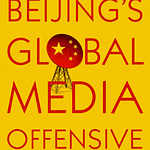
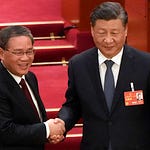
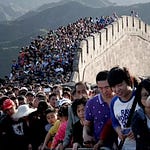
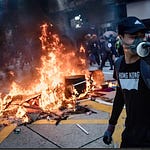


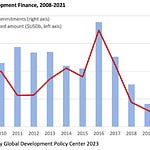
Share this post